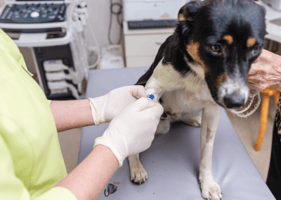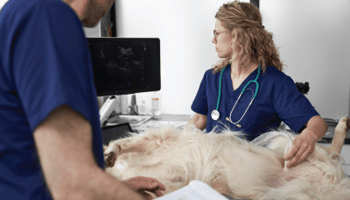Welcome to our Clinical Library!
Your place to keep up to date with the industry through free veterinary CE, news, and guides.
Whether you need videos to help with tricky procedures, or the latest research presented in an easy-to-read format, a downloadable pocket guide, or expert opinions from our specialist speakers - we've got you covered.
How to know you’re ready for advanced veterinary training
Is advanced veterinary training the right move for you? Life as a general practice veterinarian can ...
6 min read
Veterinary Technician Careers: Pathways, Credentials, and the Role of CE by Lisa Coder, MS, DVM
Many types of veterinary professionals, with varying levels of education, can be found within a clin...
8 min read
Top Questions Veterinarians and Vet Techs Have About CE Certificates (and Their Answers) by Lisa Coder, MS, DVM
There are many levels of veterinary continuing education available, in numerous formats. Free course...
10 min read
7 expert tips for postgraduate veterinary assessments – how to ace your revision and technique!
Whether you’re a veterinarian or veterinary technician, it can be daunting to approach your postgrad...
7 min read
Why Surgical Confidence Starts Long Before the Scalpel by Lisa Coder, MS, DVM
Learning is a complex process that does not take the same path for every individual. Many components...
10 min read
Vet certificates: What they mean for clinics and the veterinary profession
Elsewhere in the world, postgraduate vet certificates are much more common than they are here in the...
11 min read
8 actionable steps to reduce antibiotic use in your veterinary clinic
With over 2.8 million serious antimicrobial-resistant infections affecting people in the United Stat...
12 min read
How to assess pain in cats using the Feline Grimace Scale
Author: Dr Joanna Woodnutt MRCVS Cats are notoriously skilled at masking pain, making it difficult f...
18 min read
How to Prepare Your Veterinary Hospital for Exotic Small Mammals by Lisa Coder, MS, DVM
As the popularity of exotic pets continues to increase, many general clinical veterinarians are seei...
7 min read
How to stay on top of your veterinary continuing education—without the stress
Finding time for veterinary continuing education isn’t easy. Whether you're a DVM or veterinary tech...
12 min read
Diagnosing canine pancreatitis: The latest research into pancreatitis tests and how to use them
Pancreatitis is implicated in up to 40 % of acute-abdomen ICU admissions and carries reported case-f...
9 min read
RACE Approved CE: What it is, and what it means for Vets and Techs by Lisa Coder, MS, DVM
All veterinary professionals need continuing education to be able to care for our patients to the be...
7 min read
Pericardial Effusions in Small Animals: Causes and Diagnosis
Pericardial disease is a frequently overlooked condition in veterinary medicine. It includes a range...
16 min read
How to Balance Hands-On Training with Online Veterinary CE Lisa Coder, MS, DVM
More than ever, veterinarians have a wide variety of ways to accomplish the veterinary continuing ed...
9 min read
Taking Veterinary CE Online - Five Tips to Help You Make the Most of It Lisa Coder, MS, DVM
Veterinary continuing education (CE) is required and everyone who holds a license in the veterinary ...
11 min read
Exotic pet CE: Four Husbandry Questions to Ask Reptile Owners Lisa Coder, MS, DVM
As reptiles continue to grow in popularity as pets, it becomes more important that a general practic...
11 min read
Relief veterinarians: Steps for success, and the role of CE By Kiley Daube DVM
Remember your first day at a new clinic? The excitement of meeting your co-workers, getting to know ...
7 min read
Vet tech CE: Our 3 most popular RACE-accredited courses for 2025
We understand the vital role that well-trained veterinary technicians play in providing exceptional ...
6 min read
Four Simple Tips for Improved Veterinary Anesthesia for Technicians and Their Teams
A veterinary anesthesia technician is a critical part of the veterinary team at any clinic. Veterina...
9 min read
What to Look for in an Online Veterinary Certificate
Online veterinary certificates are a great way to improve knowledge and a useful tool for general pr...
10 min read
Canine Dermatology Update: What We Know About the Microbiome and Skin by Lisa Coder, MS, DVM
Canine dermatology is a complicated and often frustrating subject. Dermatitis is a general term that...
9 min read
Should I do a Veterinary Technician Certificate? Four Benefits to Your Career by Lisa Coder, MS, DVM
A veterinary technician certificate can be a valuable tool to assist veterinary technicians to be th...
6 min read
Explore our Veterinary Oncology CE programs in 2025
If you’re passionate about advancing your skills in veterinary oncology, our oncology CE courses off...
8 min read
MMVD, the ACVIM Guidelines, and You: What Clinicians Need to Know
As a veterinary professional, canine heart disease is a problem that you will observe commonly in ge...
12 min read
The Approach to Cases of Feline CHF: A Summary for Veterinarians
Feline heart disease is a significant concern in veterinary cardiology, requiring timely diagnosis a...
17 min read
New Year, New Goals: 5 tips for planning your veterinary CE for 2025
Christmas is a time for reflection on the last year and looking towards the next. While we hope you’...
6 min read
Free Vet Tech CE Anesthesia webinar with Nicki Grint!
This FREE recorded CE webinar covers some very easy ways that you and your clinic can improve your a...
4 min read
Pet Cancer Awareness Month: raising awareness and advancing veterinary oncology training
November is Pet Cancer Awareness Month, a time dedicated to bringing attention to one of the most cr...
5 min read
Why Veterinary Mistakes Happen and How to Recover
Veterinary professionals often hold themselves to the highest standards, striving for excellence in ...
12 min read
Veterinary Emergency and Critical Care: an exciting, challenging field
Veterinary emergency and critical care (ECC) is one of those areas in veterinary medicine that you e...
7 min read
You have viewed 30 of 257 articles






























